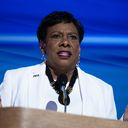NYC business leaders gear up for back-to-back meetings with Zohran Mamdani

Andrew Harnik/Getty Images
- NYC business leaders are planning back-to-back meetings with Zohran Mamdani next week.
- Tuesday's meeting could draw about 100 CEOs, said Kathryn Wylde of Partnership for New York City.
- Wednesday's meeting is expected to focus on the city's tech sector.
New York City's mayoral frontrunner is expected to be busy next week trying to convince the city's business leaders that he's the man for the job.
Dozens of the city's business leaders are gearing up to talk with Zohran Mamdani, who clinched the Democratic nomination for mayor last month, in a series of closed-door meetings next week. The gatherings, scheduled for Tuesday, July 15, and Wednesday, July 16, in midtown Manhattan, were arranged by the Partnership for New York City, a business advocacy group.
Kathryn Wylde, the chief executive of Partnership for New York City, said about 100 CEOs are expected to attend Tuesday's gathering, to be cohosted by Rob Speyer, CEO of property investor and development firm Tishman Speyer, and Albert Bourla, CEO of pharmaceutical giant Pfizer.
Wednesday's event will focus on leaders from the city's technology sector and is expected to be led by Kevin Ryan, founder and CEO of AlleyCorp, a venture capital firm, Wylde said.
"They want to understand what his affiliation with the Democratic Socialists of America really means," Wylde said of the 33-year-old self-described socialist who rattled business leaders when he defeated former governor Andrew Cuomo in the Democratic primary.

Anna Webber/Getty Images for New York Magazine
Wylde did not specify where the meetings are expected to take place, citing concerns that it could draw protesters. A spokesman for Mamdani didn't return a request for comment.
Mamdani clinched the Democratic primary in a city that tends to vote blue on a platform that vowed to fix housing and other affordability issues plaguing the city's residents. He has pledged to build $100 billion of new affordable housing and offer free bus service and childcare. He has proposed a 2% tax on millionaires in the city to help pay for his agenda, although he would need approval from state legislators and the governor for any new levies.
"They are concerned that his campaign focused on how to solve problems by raising taxes and spending more money," Wylde said. "Does he understand that New York is in a competitive position when it comes to jobs and private investment and that there is a point at which you can't get blood out of a stone?"
The Partnership for New York City boasts some powerful members, including Jamie Dimon, chairman and CEO of JPMorgan, Larry Fink, CEO of BlackRock, Steve Schwarzman, chairman, CEO, and cofounder of Blackstone, and David Solomon, chairman and CEO of Goldman Sachs.
Spyer and Bourla are co-chairs of the business advocacy group's board.
Some business leaders have said they won't be convinced of Mamdani's viability and have banded behind incumbent mayor Eric Adams in an effort to defeat the young political star in the general election this fall.
"I fully support Eric Adams and I think others will too, based on people I'm speaking with," said Jared Epstein, a Manhattan real estate executive who co-hosted a fundraiser for Adams in Bridgehampton on Long Island over the July 4th weekend with John Catsimatidis, a wealthy former Republican candidate for NYC mayor. "Mamdani is in for a rude awakening if he thinks he's going to take this city."
Adams was indicted last year by federal prosecutors for accepting gifts from a Turkish official and related businesspeople. The case was dropped by President Trump's Justice Department, but it inflicted damage on Adams's candidacy, according to polls.

